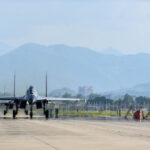# Prem Sagar Poudel
Indian Army Chief Manoj Pandey is coming to Kathmandu on September 4 for a 5-day visit to Nepal. Pandey started coming to Nepal to receive the Honorary General of the Nepali Army. There is a tradition of honoring the army chiefs of both Nepal and India with the honor of Honorary General in each other’s country.
The practice of honoring army chiefs in each other’s countries between Nepal and India was started in 1950. The then Indian Chief of Army Staff General Kodandera Madappa Cariappa received the honor of Honorary General for the first time from Nepal. Before Pandey, 18 Indian military officers have received the Honorary General of the Nepalese Army.
Pandey, who will stay in Nepal for five days, will also be given a tour of some barracks by the Nepalese Army. He will receive the Honorary General of the Nepalese Army from President Bidya Devi Bhandari. During his stay in Nepal, Pandey will meet Prime Minister Sher Bahadur Deuba. It has not been revealed whether the meeting will be held as the Defense Minister or as the Prime Minister.
During the visit, General Pandey will pay his respects at Sainik Manch Tundikhel at Bir Smarak. After receiving honors at Army Head Quarter, he will participate in a meeting and discussion program with Nepali Army Commander-in-Chief General Prabhuram Sharma. During General Pandey’s visit to Nepal, there is a program of handing over various materials to be provided as support to the Nepalese Army on behalf of the Indian Army. There is a program to interact with the students of the Command and Staff College and visit the Central Command Headquarters Pokhara.
On the eve of Pandey’s visit, the Deputy Chief of Mission (DCM) of the Indian Embassy in Kathmandu Namgya C Khampa had a meeting with Home Minister Balkrishna Khand. General Pandey’s impending visit to Nepal was discussed in the meeting held at Singh Durbar on 1 September. The meeting held by the Indian diplomat with the Home Minister Khand regarding the visit of General Pandey, who is welcomed to Nepal on behalf of the Nepalese Army, is viewed with suspicion. Generally, to meet the staff of foreign affairs is enough for a diplomatic task. Khampa met the Home Minister at the time of meeting the officials of the Ministry of Defense due to the visit of the Army Chief.
A sign of visiting Pokhara
Pokhara, a tourist city in western Nepal, is an important border pass with China’s Corola border. The construction of the road from Pokhara to Baglung was done by the Chinese government. Currently, the work of Kaligandaki Corridor to connect Corola with Triveni in Nepal-India border area is in the final stage. It seems that Nepal’s trade with China will be facilitated after this highway is put into operation. For this, it seems that China should open Corola as an international border pass. The border pass is now closed.
The construction of an international level airport with Chinese investment in Pokhara has been completed recently. The cost of the airport is now being discussed in the Nepali media. At this time, General Pandey is visiting Pokhara following the style of the then Indian President Pranab Mukherjee in the year 2073 BS. The central command headquarters of the Nepalese Army in Pokhara has been managing the troops up to Mustang, which is connected to the border with China. There is a special welcome program for General Pandey at the central command headquarters, which has the authority to provide security up to the Nepalese northern border.
India has been trying to make Pokhara the base area of central Nepal for a long time. In the west, the Kalapani area is being used as a base camp by the Indian Army. India has also been operating a military camp in that area by encroaching on Nepalese land. After Nepal released the Chuche Map, India’s evil policy was widely opposed. However, till now, India has not officially proceeded with the talks with the Government of Nepal on this matter.
In eastern Nepal, they think of developing the Arun-3 hydropower project as a center of Indian military activity. Indian government company Sutlej Hydropower Corporation is constructing the project. 50 percent construction of the project in Sankhuwasabha district has been completed. Kimathanka pass is only 17 km away from the project site of Arun. The Koshi Corridor connecting the eastern industrial city of Biratnagar by road to Kimathanka is under construction.
It seems that India, which has built an important base near the border area of China in the west and east, is trying to build a base in the central region around Pokhara. During the earthquake in Nepal in 2072 BS, India sought permission to carry out rescue work in the northern region of Nepal using Pokhara as a base. After the then Prime Minister Sushil Koirala ignored the issue, as a result India flew helicopters to Gorkha and other areas in Pokhara.
The construction of Siddharth Highway connecting Pokhara with India, which is used as the base of Khampas, was also done with Indian assistance. Khampas also worked on that highway. After the Khampas surrender with their arms, for the first time in Nepal, they were assigned to the construction of the highway with the help of India. They saved their lives with the money that came as wage laborers. Later they were settled in camp management and carpet weaving. At that time, the carpets woven by the Khampas got a good price in the European market. It seems that ‘Made by Khampa’ is more important than quality.
General Pandey’s visit seems to give more strength to India’s idea of focusing on Pokhara for a long time. It has been prepared to be welcomed to General Pandey with a special program at the Nepal Army camp in Pokhara.
Attempt to agree on Agnipath
General Pandey’s visit to Nepal is his second foreign visit after Bhutan. One of the reasons behind this is Agnipath. The Government of India recently decided to implement a new recruitment scheme called Agnipath in the Indian Army. According to which the new recruitment in the Indian Army will be for four years.
After four years, only 25 percent of the manpower will be continued in the army. The rest of the manpower will be given an opportunity to compete in paramilitary forces. INR 11 lakh will be provided during the retirement. According to the Government of India, this scheme will also be applicable for Indian Gurkha soldiers.
The Tripartite Agreement of 1947 allowed Gurkha recruitment to continue. Earlier, the work of Gurkha recruitment was done by the British government. It is mentioned in the agreement between Nepal, India and Britain that the Indian government will continue this after India’s independence. After India tried to recruit Gurkhas according to the new policy, it has been opposed in Nepal. On the verbal request of Nepal, the Gurkha soldier recruitment program scheduled to be held in Butwal on August 24 and Dharan on September 1 has been postponed. In a press conference held in New Delhi on August 25, the spokesperson of the Indian Ministry of External Affairs, Arindam Bagchi, said that the recruitment of Gurkha soldiers will continue.
The Indian Army had sent a letter to Nepal on June 14, 2022 to facilitate the recruitment of new recruits as per the tradition. The Nepal government has not yet responded to the letter. Prime Minister Sher Bahadur Deuba discussed the Indian Army’s letter with Foreign Minister Narayan Khadka and Prime Minister’s Foreign Affairs Adviser Arun Subedi on August 23 and 24.
This discussion could not make a clear policy. Prime Minister Deuba is preparing to give a final answer after further discussions with the ruling coalition and political parties. General Pandey’s visit will make this matter more clear. In other words, General Pandey started coming to Nepal with the idea of getting Nepal to agree to Agnipath.
After the discussion with the Prime Minister, Foreign Minister Khadka called Indian Ambassador Naveen Srivastava to the ministry on August 24. According to the ministry, the foreign minister has replied that Nepal is positive to facilitate the recruitment of Gurkhas. The recruitment was stopped after Foreign Minister Khadka informed that a formal reply will be given only after discussion with the political parties of Nepal.
The Tripartite Treaty of 1947 is silent on the term of service. Adviser Subedi is of the opinion that the current four-year plan will not cause problems in recruitment. Subedi has been arguing that the recruitment process should not be stopped as the Nepalese youth have a free right to join the Indian Army or not.
Foreign Minister Khadka said that the ‘Agnipath’ scheme ensured only four years of service to the youth and that the decision of the youth to be returned should be made after deliberation. According to Minister Khadka’s opinion, Prime Minister Deuba has reached the point of moving forward after discussing with the ruling coalition and political parties. One of the reasons behind this is the upcoming elections. Prime Minister Deuba is of the opinion that the opposition UML will put this issue on the agenda during the election and put the alliance in trouble.
The government of Nepal has not yet discussed what kind of policy to make for the youth, who will become unemployed after four years, in the Indian army to learn how to use weapons and explosives. The subject of skill abuse that they have learned in four years is equally important. Young people in India staged a violent protest saying that after four years of service, they would have to be unemployed again and this would disrupt their studies and future. However, the Indian government has already started the recruit process by implementing the scheme.
The Indian government has introduced the ‘Agnipath’ scheme as part of the military reform program to reduce the pension budget. Under this, youth between the ages of 17 to 23 are being recruited as ‘Agniveer’. ‘Agniveer’ gets a monthly salary of INR 30,000. In the first phase, India has planned to recruit youth in the security forces at the rate of 46,000 for 4 years.
An attempt was also made to discuss India’s recruitment to Agnipath in the International Relations Committee under the Parliament of Nepal. The discussion program has been postponed as the quorum of the parliamentarians was not reached twice. The UML, the largest party in the Parliament, is not in favor of India’s unilateral new policy regarding the recruitment of Gurkhas.
On the 30th August, President Bidya Devi Bhandari called Prime Minister Deuba and other Nepali Congress leaders to meet. During the meeting, President Bhandari suggested further debate and discussion on the issue of soldier recruitment under the Agneepath scheme. It is reported that President Bhandari emphasized that the government should discuss with all the stakeholders as the recruitment in Agneepath will have a significant and long-term impact. In response, Prime Minister Deuba promised to the President Bhandari that he would discuss this matter with political parties and move forward.



